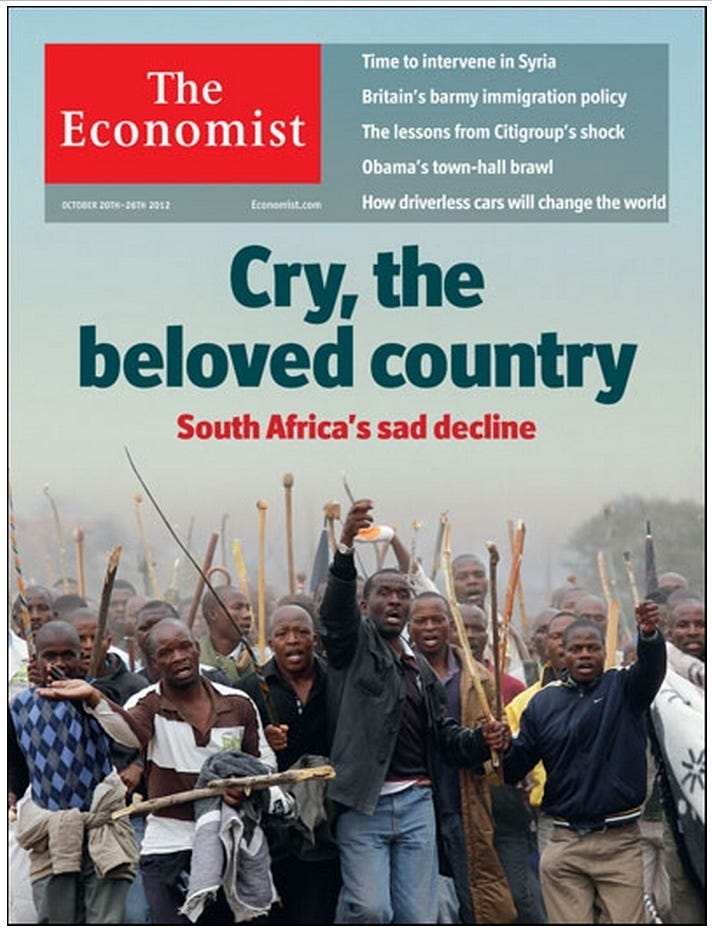Smile, the beloved country
South Africa is the feature of this week's edition of The Economist. The magazine paints a pessimistic picture of South Africa's future, summarised by the cover caption of "South Africa's sad decline". Its lead article makes two points: that the country's bad economic performance is mostly but not entirely the result of the African National Congress, the party that has ruled South Africa since its first democratic elections in 1994; and that the only way to solve the current crisis is to make political competition a reality. This is not wrong, but it is quite weak and simplistic, especially coming from The Economist (as Ferial Haffajee, editor of South Africa's City Press, agrees). South Africa's future depends on much more than simply political competition, and its recent past is also more complex than the linear decline The Economist insinuates.
Thabo Mbeki's reign was not all bad. Between 1999 and 2008 (his two terms), the South African economy grew at an average of 4.2% per annum. According to most development economists and across several poverty indicators, the high growth caused South African poverty to decline significantly in this period: the World Bank estimates that this was from a poverty headcount ratio of 38% in 2000 to 23% in 2006, although this may be too optimistic. See Yu (2010) for a more detailed analysis. We tend to forget that many of the problems we encountered over the last five years - electricity cuts, infrastructure failures, yes, even service delivery backlogs in cities - are partly the results of faster than expected economic growth.
More recently, legal (and illegal) immigration has continued to soar. If the country was really falling apart, why would thousands of (economic) migrants be tempted to our shores, and those that left earlier, to return? (Yes, push factors play a role, notably the bad economic conditions of Zimbabwe, DRC and Somalia, and the global economic crisis, but if, as The Economist would have it, other African countries are on the up while South Africa is going down, why don't migrants stream to these countries? The answer: South Africa is still a land of opportunity.) Our financial system remains one of the best in the world. (Yes, that's right folks: according to the World Economic Forum’s Competitiveness Survey, South Africa ranked third on overall financial market development, first in the regulation of securities exchanges and first in the strength of auditing and reporting standards.) We receive close to 10 million tourists annually who appear to enjoy the rural and urban wonders of South Africa, and these numbers continue to grow. Our companies are investing in African markets like never before, in manufacturing, retail, telecommunications, banking and agriculture. We are at the forefront of mobile technology and payments which could revolutionise trade and exchange. We have earned the right to host the Square Kilometre Array which will look further back into the past than ever before, and we continue to make new palaeontological finds that helps to unravel the history of mankind.
This is not to deny the many challenges we face. The prolonged mining strikes have dented investors and the public's confidence, cost mining companies millions of earnings, and the South African government billions in unearned taxes (a back-of-the-envelope calculation suggests that lost tax revenue from these strikes equals the annual amount spent on bursaries for South African students). The Nkandla mess, where R247 million of taxpayers money will be spent to built a private residence for president Zuma in rural Kwazulu-Natal, reflects the general attitude towards corruption and cronyism in government. (Let's be optimistic: as in the tradition of European monarchs who used to spend gazillions on summer palaces, perhaps in a century's time, Nkandla will be as synonymous with South Africa as Balmoral Castle is with Scotland, drawing millions of visitors to the countryside.) HIV/Aids has dwindled in media attention, but it's still very much real in the lives of millions of South Africans. The quality of education is bad. Crime is violent and personal security poor. Inequality persists.
But South Africa is not dead-and-buried. It's not a failed state, or a banana republic. We are not hopeless. On the contrary, after 18 years of democracy, reality has finally sunk in. We've realised we are not a miracle, even though the political transition was unique: we are "sad" only because the lofty (and perhaps unrealistic?) ideals we envisioned in 1994 did not materialise.
Perhaps, looking towards the next 18 years, reality is a better point of departure. And it suggests that there are still many reasons to smile.


